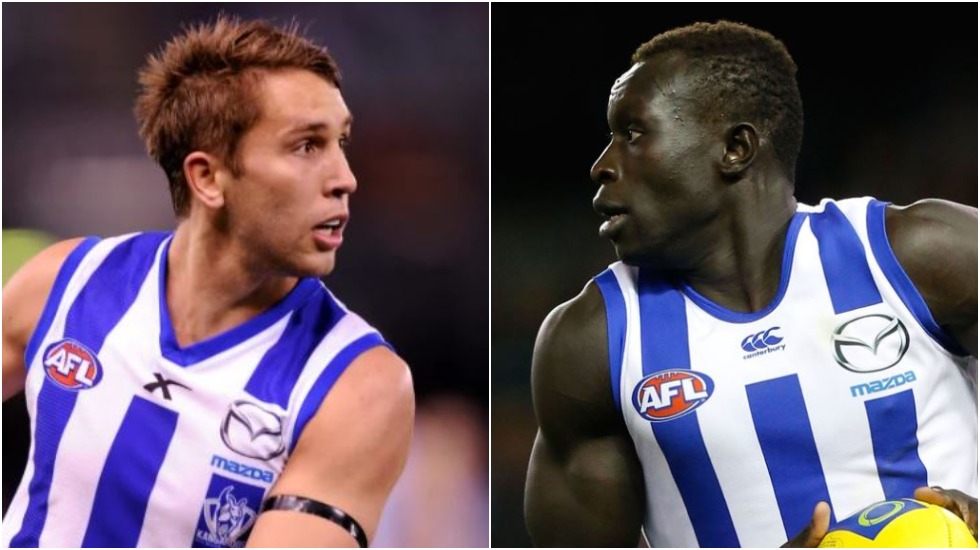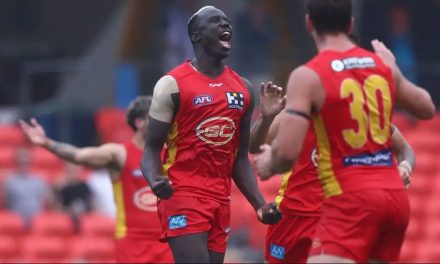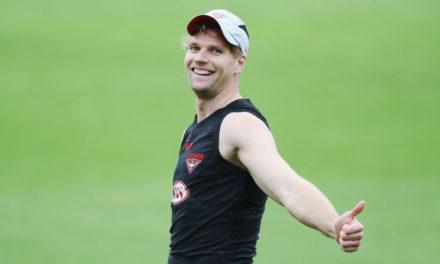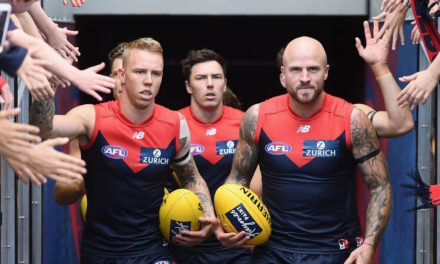Jamie Macmillan (left) and Majak Daw, two of 11 North Melbourne players delisted last week after the Roos’ season finished.
I’ve been involved in the world of AFL for over 20 years and have seen some players transition well out of the game. And some not so well.
And watching a past player, particularly those who have become your friends, take the plunge into their new role in society with difficulty can be heart-breaking.
It’s a change which comes at a personal cost to them and their loved ones. It’s that loss of identity that is felt immediately after having been involved in football clubs, for many for the majority of their lives.
For us supporters, the new stars on the field soon catch our eye. We move on to new heroes, new numbers on the backs of our supporter guernseys pretty quickly.
When I heard last week that North Melbourne had delisted 11 players in one hit, my heart started to ache for them.
We have followed the path of the likes of Majak Daw, who has fought hard to work on his mental and physical wellbeing in order to win back a spot in North Melbourne’s senior team. There are veterans like Jamie Macmillan, who has played 167 games at the club over 11 seasons.
There was Joel Crocker, Jasper Pittard, Ben Jacobs, Marley Williams, Tom Murphy and Lachie Hosie, Paul Ahern, Mason Wood and Sam Durdin, all told there would not be a spot on the 2021 list for them.
That was just the first batch of players to get their marching orders. There’s been plenty in subsequent days. And there will be plenty more before those lists for next year are finalised as clubs do their paperwork and as those clubs remaining in the premiership race are progressively knocked out of the finals.
For some, in the frenzy of trades and signings, there will be the chance for a new beginning. But for many, the dreams of an AFL career have effectively just been ended.
How will they cope? The question intrigued me enough to look into how the AFL Players’ Association helps players with their transition, which for many will be a reality in the coming weeks.
There are still two years left on the current collective bargaining agreement (CBA), but like literally every other part of our lives, the COVID pandemic has impacted on several areas being negotiated. List sizes for next year, still to be determined, could have a big impact on a lot more players’ capacity to win new contracts.
“Transition is a big issue for us as it is a challenge for every single player,” says AFLPA chief executive Paul Marsh.
“As such, we start the transition process when players first come into the AFL, with a range of programs including a formal induction process, education and training grants offered from the start of players’ careers and a real focus on helping players maximise the opportunities that come from an AFL career.”
Players are taught about finances, and a retirement fund is set up for them with stages of payments over a number of years, depending on the length of their careers, to best support their transition, into their new lives.
PLEASE HELP US CONTINUE TO THRIVE BY BECOMING AN OFFICIAL FOOTYOLOGY PATRON. JUST CLICK THIS LINK.
There have certainly been some major improvements to the AFLPA’s player support structures post-career over the past decade.
There is a big emphasis on connecting with people around the player and seizing upon the networks that are available to them, along with life skills we should all learn along the way, like valuing and nurturing relationships.
The AFLPA has placed a bigger priority on players understanding the importance of having a decent life balance with their work, not putting everything into the football space, and essentially having a back-up plan.
When a player is delisted, the AFLPA meets with them one-on-one to see how they want to be helped. It’s a service that is offered to all players.
For the last three years now, the AFLPA has conducted a “Transition Camp” for delisted players. They are invited to a camp where they are educated about some of the challenges ahead.
Part of the program there is a “Job Fair”, which has proved successful, some delisted players actually leaving the camp already having found employment. It’s still an evolving concept, but one which has enormous potential.
The AFLPA, which now has 5000 past players registered, has $4 million set aside each year for a hardship fund, to provide for past players who may need an operation, medical support, or just a financial break. It’s not means tested, and it makes a genuine difference.
COVID is making life difficult for all of us, in our work lives as well as at home. It only makes sense delisted footballers would be feeling this, too. Perhaps even more so, given those who can usually transition to various state and country leagues have this year not had that opportunity.
“There has been a significant increase in the support we have provided to past players this year, as it’s been a particularly challenging year and we are seeing more cases of hardship,” Marsh says.
Past players also have access to a national psychologist network of over 120 psychologists. It is free to members of the AFLPA, and confidential. It pleases me no end that all involved recognise this as a healthy part of healing and maintaining their mental health.
After researching the issue, I’m feeling a little less anxious about the sort of future this year’s crop of delistings will face.
I’m sure there will still be bumps in the road for many, like we all experience when we have a major change in our lives. But past players are now more fortunate to have access to extra support and the opportunity to help them navigate their new directions.
“Players and their family members can reach out to the AFLPA,” says Marsh. “We are only too happy to provide support and help for past players in need.”
I find that reassuring enough. And I’m sure all those players unfortunate enough to receive bad news about their AFL futures over the next few weeks will find it an even greater comfort.













Awesome piece, Shelley, good to shine a light, where few go. Particularly as the the footy gravy train has dried up for many, it will be tough. Feel for JMAc, with a newborn, and of course Majak, who I thought deserved another year